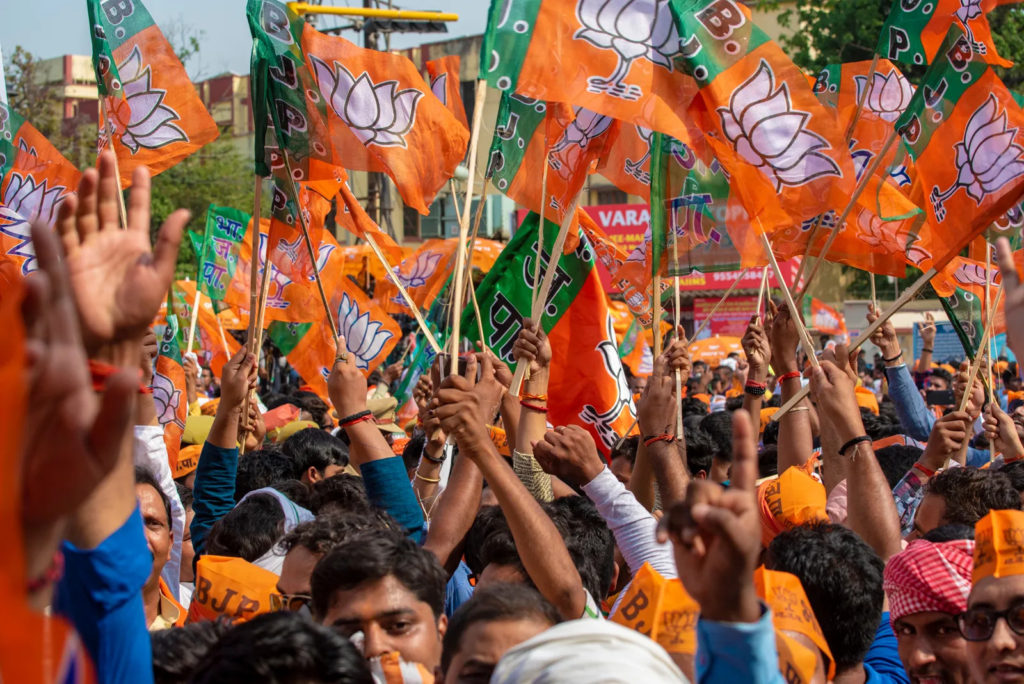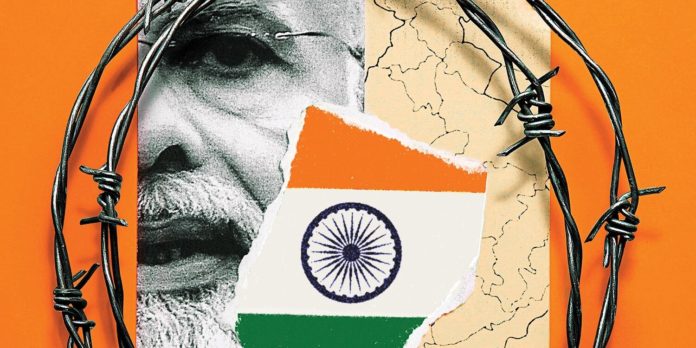Contemporary Indian politics under the government of Narendra Damodardas Modi has added a new chapter in the history of Indian politics, which has witnessed the prevalence of various ideologically fanatical political trends under different political regimes of New Delhi. The changing faces of governments remained effective in suppressing the rights of the non-Hindu segments of Indian society. Unlike various previous attempts of advancing Hindutva ideology in Indian society, the present government of Modi has revolutionized the interconnectedness between Hindutva ideology and New Delhi’s domestic politics. Modi’s government has introduced various steps for making India a Hindu-only-nation under the influences of its Hindutva ideology. The dramatic changes in the political orientations of Hindutva ideology have created the Modituva ideology based on greater support of the Modi government. The shadows of Modituva ideology in Indian domestic politics initiated a process of Hinduization across India and spread fanatical ideological practices in Indian society. The large-scale support of violent ideological trends in society mainly disturbed the constitutional foundations of the Indian nation which legalized the security of non-Hindu communities in India. Despite legislating the rights of minorities and the protection of minorities in the official framework of the Constitution, the sufferings of the non-Hindu communities multiplied with the arrival of Modi in New Delhi as the fourteenth prime minister of India. The process of Hinduization is originally linked to Modi’s ethno-nationalism, which has a negative impact on India’s mainstream minority protection laws. Modi’s version of Hindutva has raised the slogans of nationalist agenda with the support of Hindu ideology without calculating the impact of fanatical ideological trends on the socio-political culture of the country. The transformation of socio-political culture in the form of Modi’s Modituva ideology raised an uncontrollable wave of countrywide communal violence in India. This countrywide spread of violence resulted in massively marginalizing the role of different religious minorities in India. These changes in Indian society have made Modi a popular leader and a progressive prime minister due to his societal, political, and economic reforms on the one hand. On the other hand, the multidimensional religious reforms of Modi have intensified the role of extremist ideological factors in India due to the extensive alternations of Hindutva’s fundamental ideological framework.
In view of the changes mentioned above in domestic Indian politics, it is appropriate to maintain Modi’s way of managing New Delhi under his own ideological orientations has attacked the constitutional foundations of India. The role of Hindutva ideology cannot be separated from the mainstream infrastructure of the Indian state and society. Indian politics have always remained under the heavy influence of Hindu ideology throughout the history of different political administrations in New Delhi. An overwhelming wave of ferocious ideological patterns is the main cause of several vicious socio-political developments across India despite having a large number of non-Hindu communities. All these developments under the Modi regime have been considered internationally as illegitimate political moves of New Delhi against its fundamental constitutional framework. A large number of the non-Hindu population in different parts of the Indian State has formally been recognized by the Constitution of India as respectable citizens. The Constitution of India laid the foundation of the supreme law of India decades ago in the post-partitioned subcontinent and attempted to create a secular, peaceful society beyond violent ideological divisions. The initial legislative circles of India, after the partition of the subcontinent and the post-British colonial environment, defined India as a Sovereign, Socialist, Secular, Democratic, and Republic to secure its citizens. While keeping the actual spirit of a Secular nation, the Constitution of India has categorically mentioned the security of minorities under the Hindu majority in its articles 29 (Protection of Interests of Minorities) and 30 (Rights of Minorities to Establish and Administer Educational Institutions). Both Articles emphasized the rights of minorities due to the threats of minority rights violations in a Hindu majority state. The official text of both Articles of the Indian Constitution integrated the undeniable presence of minorities into the formal legislative mechanism of New Delhi. In contrast to the constitutional recognition of minorities across the Indian society, the arrival of different political regimes in New Delhi invested their full potential in converting India into a Hindu-only nation. The politically undeclared and formally unaccepted vision of creating India as a Hindu-only-nation has revealed various anti-minorities policies of New Delhi under different governments. The changing political regimes in New Delhi throughout history were inefficient and incompetent in discouraging the prevalence of fanatical ideological trends in mainstream domestic politics. A comprehensive survey of Indian political history has unveiled varying levels of informal anti-minority practices during the Bharatiya Janata Party (BJP) governments. A glimpse of the Modi administration can easily validate that the ideologically extremist political designs of New Delhi have always remained a prime security concern of minorities in India.

The Modi administration has preferred the reassertion of Hindutva ideology in mainstream domestic politics as the most suitable tool for strengthening its position in Indian politics. The use of the religion card in politics has partially provided the desired results for the BJP’s rule in India, but the worse impacts of the Hindu ideology and its expanding pressures on the minorities have undermined the vision of peace and harmony in society. In response to Modi’s violent assertion of Hindu-ness in society and the advancement of anti-minorities sentiments across the country, voices of resistance have started emerging from different quarters of indigenous politics.
The mainstream Indian leadership has expressed deep concerns about Modi’s way of disturbing the political manifestations of the Hindu religion. In April 2022, leaders of different political parties expressed their positions on Modi’s reluctance in denouncing publicly the increasing wave of communal violence across the country. Including the Congress President, Sonia Gandhi, the representatives of thirteen different political parties condemned the silence of prime minister Modi on the expanding violence against minority rights. The policy to brutalize minorities and threaten different segments of non-Hindu communities directly affects the main pillars of the Indian Constitution (justice, liberty, equality, fraternity, and secularism). Attacks on minorities’ residential areas, their education centers, community gatherings, and worship places have been highlighted by non-political circles of Indian society. The standing of these leaders has raised serious concerns about the security of non-Hindu nations, which could secure the national image of India in the international community. A renowned Indian intellectual, Arundhati Roy, has highlighted at different national and international forums the brutalizing of non-Hindu communities under the leadership of the BJP. In her recent interview with CNN, Arundhati Roy called Modi’s minority-marginalizing policies the Modi administration’s refugee-manufacturing policy by categorically referring to the anti-Muslim Citizenship Law. Moreover, the proponents of peace and human rights from different corners of the world have endorsed the views of domestic Indian leaders and intellectuals about the rise of communal violence under the Modi leadership.
The formal positions of various Indian politicians provide sufficient validation for the Modi government’s promotion of anti-minorities sentiments across the Indian society. A large-scale promotion of Modituva across India has changed the socio-political culture of India with the help of various fanatical ideological campaigns. The widespread acceptance of these fanatical ideologies across Indian society is the gravitational point of the Modi government, which has undermined the constitutional foundations of India. Modi’s unrestricted support of violent communal sentiments through various covert and overt means has jeopardized the Socialist and Secular attributes of the domestic political system. A countrywide culture of Hindutva-specific policies, cemented in Modi’s Hindu-inclined behavior has not only stigmatized the secular image of India, but these features of New Delhi have fractured the values of peace and harmony in Indian society. Thus, it can easily be said that the emerging less-secular and more extremist ideological trends of the BJP’s regime are persistently converting India into an intolerant society based on multifaceted socio-political designs of Modituva ideology.
The proponents of peace and human rights from around the world need to realize the suffering of non-Hindu religious minorities who are passing through an extremely critical phase under the BJP’s government. The report of different human rights organizations has already acknowledged the marginalized role of non-Hindu communities in India and their miserable condition because of Modi’s vision of creating a purely Hindu-ized society in India. The serious attention of the international community could be a productive measure of protecting the vulnerable presence of minorities in India under the shadows of Modituva.




